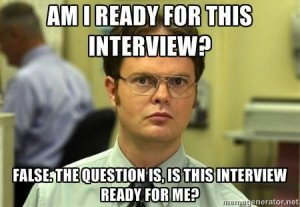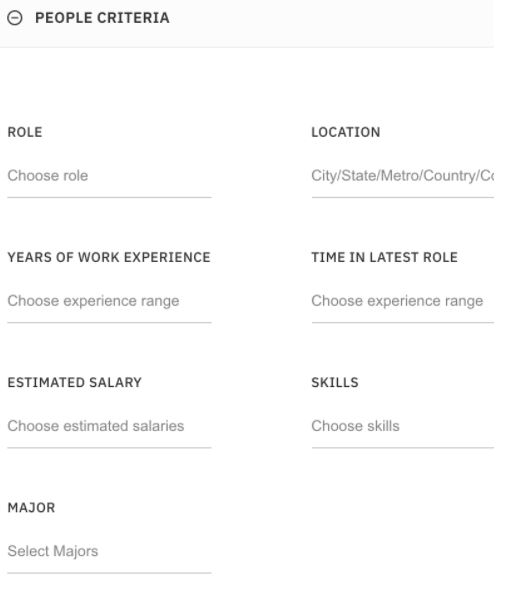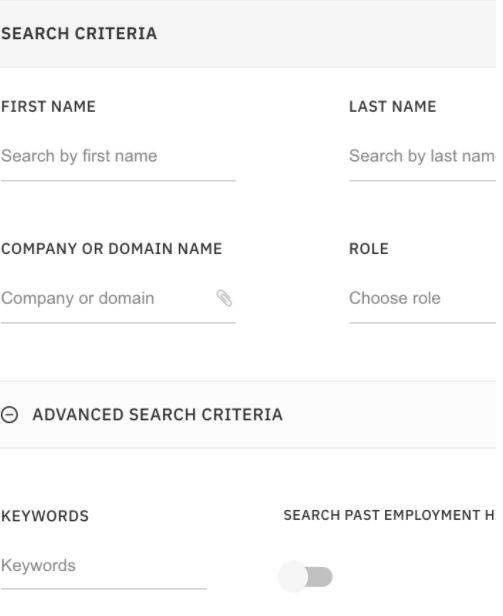Without an effective sales hiring process, you’re going to churn through rep after rep.
The actual hiring of your reps should fit into your entire sale recruitment strategy, which in turn, should fall into the larger concept of building a great sales team.
Given enough time, you’ll hire a dud. We’ve learned the hard way. In our last round of sales recruitment, we actually had to fire someone on their first day.
Like a big pain in the neck that never should have walked into your office in the first place, a dud. Shining resume, experience galore, and they’re terrible.
That’s the bad news in sales recruitments.
The not-so-bad news is that these situations when recruiting sales reps can be brought to a minimum, but only if you add some barrier to your sales recruitment strategy. Put things that will stop bad candidates from slipping through the sales hiring process and steps that will shoot red flags up along the way.
In sales, it’s all the more important. Before we get too far, we thought it would be helpful for you to grab this sample sales hiring template (no email required!).
Sales Development Reps (SDRs) on the team (typically) enjoy certain amounts of self-management.
Only time and results are indicators that a new person isn’t working out.
Unfortunately, good performance and showing up can be accomplished by someone who is unethical—making the interview process so vital for a healthy recruitment sales team.
Our post today will pull back the curtain and detail our 7-step interview process for hiring SDRs.
Here’s a quick look:
- Application “Easter Egg”
- Phone Screening
- Face-to-Face Interview
- Assessment Test
- Written Test
- Coaching Test
- Reference Check
Consider these 6 Sales Environment Elements Before Hiring
Competition
The more an individual knows about the competition, the better they are able to sell their product over theirs. Find a salesperson who’s persuasive and engaging when meeting with potential clients. It can allow for distinguishing features of one’s own company while contrasting those offered by others to make a sale happen.

Rejection
Rejection can build bridges for the future, so a salesperson must not give up hope! If a prospect decides to go with the competitor because they are looking for something other than what you offer now, the sales recruits must take it in stride. You never know when that person will come back and want more of what your company is cooking.

Hostility
The world of marketing is a competitive and aggressive one. There are two different environments: the collaborative environment, where companies work together to better themselves in their own industry; and the hostile environment, where they compete against each other for customers’ attention on an even playing field.

Lack of Control
It is difficult to monitor performance versus budgets, forecasts, and timetables as a consequence of inadequate internal controls. A lack of attention to information security results in privacy issues and the possibility of illegal access. It may lead to compromised accounts or stolen assets from inside a company, among other things. Given the prevalence of employees accepting bribes to conceal theft—including falsifying records—it has become critical for businesses to take every precaution possible when budgeting their resources effectively and protecting sensitive data. 
Resistance
The word resistance is the only thing stopping you from closing tough sales. Resistance can be behind a customer’s head shaking, their quick departure, and “we’ll think about it.” When customers are saying ‘no,’ they’re really telling you that they’ve heard your offer before or don’t get what you have to say. When recruiting for sales positions, look for a salesperson who understands how resistance may affect a sale – either directly or indirectly-and then transform prospects with insight from someone who knows all too well just how important persuasion skills are today!

Time
Every second count and every minute can mean the difference between success and failure. When hiring sale staff, find someone that you spends time on your marketing campaigns, so that you’ll get better sales result.
Follow These 7 Sales Hiring Steps to Recruit Top Sales People
1 Application “Easter Egg”

Disney/Pixar is the king when it comes to putting hidden references into things, otherwise called “Easter Eggs”.
They’ve foretold pretty much every upcoming movie with small, almost unnoticeable glimpses in previous films.
How does this relate to hiring? Good question.
Don’t just have prospects fill out an application. Start the interview process from the onset by weeding out anyone who doesn’t pay attention to the details.
Do this by putting in a secret “easter egg” into the form or page for potential hires.
For instance, if you are having interested parties email you, have them write a specific subject line in their email. How about an example:
“To apply email me @ __________. Be sure to put “I eat spam sandwiches” in the subject or I will not reply.”
There will be many emails that have no reference to spam—guaranteed.
If you have an online application, put some small, but noticeable requests (noticeable to those who pay attention). How about, “Instead of your High School, put your favorite movie of all time in its place.”
Note: Obviously, don’t take away necessary information to find out their favorite movie. And don’t make it too good of a hidden requirement. You don’t want qualified people to not figure out your complex riddle.
Doing this one thing will work wonders in weed eating.
If they don’t pay attention now, it’s likely they won’t start when they get the job.
Reading into every detail that leads communicate is vital to the nurturing/qualification process.
2 Phone Screening

If a prospect replies (with the egg) and they seem like a good candidate, don’t schedule a sit-down just yet.
Even if you’re desperate for someone to fill the sales role for your rapidly growing business, jumping the gun can cause a lot more problems than ensuring a quality hire.
Get them on the phone for a 10-20-minute screening call.
In sales, they’ll be on the phone a lot.
Our interview process is built to gauge interviewees in every aspect of their day-to-day responsibilities. This can take time, but it’s time well spent.
One great question that is also a great tell comes from RecruitLoop (here’s their favorite seven phone questions).
Ask candidates: Can you remember applying for this position? Share on XGenius!
Job seekers apply for jobs, and good on them for it.
However, if a person applies for ten positions they may not remember your weird Easter egg. Unless they take some time to get prepped for the phone call. This strategy can be used for the restaurants too and obviously should be included in the interview questions for restaurants.
If they do their prep work before their interviews, they won’t be “on the market” for long.

SDRs have to have their stuff together before they talk with leads. If they already do this by prepping for phone interviews, they are likely worthy of a full interview.
3Face to Face Interview

If they’ve made it through your first two mini rounds, it’s worth your time to meet them in person.
While it’s important to understand that you will be trying to find specific information by asking questions, there is something WAY more important.
So, questions are important. In fact, they’re more important than you may think.
Interviewing is not just about their answers—especially in hiring sales.
- How does the person conduct themselves? Calm, nervous, pretentious?
- What style of language do they use? Poor English, common/normal, super smarty-pants?
- How succinct and clear are their answers? Talk your ear off, wordy, concise?
In order to find these things out, you have to ask questions that are virtually impossible to be answered by a simple “Yes” or “No”.
Here are a few specific questions for sales hiring to give you an idea:
- How do you personally approach handling objections on a sales call?
- At what point is a lead no longer worth pursuing? (This one can give you great information while telling you how your interviewee handles themselves.)
- What is your least favorite part about sales?
If the person you ask gives you a simple one-sentence answer to these, they may not be worth pursuing further.
4 Assessment Test

Now it’s time for qualified candidates to move further down the gauntlet.
Sales assessments are tests that get into the mind of those looking for work in the industry. Share on XDepending on the type you use, the test may tell you how good a person fared (1-2 is not a good fit, 3-4 is decent, a 5 is great).
There are companies that help you with this, or you can come up with your own.
Doing this will help you get answers that you may not have been able to get in the interview. Most of these tests present similar questions in different forms to dig into how your candidate really thinks.
It’s also the easiest step for you.
However, you will have to make a judgment call.
If a person lands a 2 out of 5, but has passed with flying colors until this point—you’ll have to decide.
This potential dilemma may warrant a policy.
For instance, if a person scores less than X; they don’t move on. If they score Y, it’s up to the manager.
Keep in mind that this test isn’t just semantics. Your SDRs and BDRs will need smarts to prospect and handle sales tools (lead gen software, CRMs, etc.)
5 Written Test

Yep. You read that right.
We take our interviewees back to their school days and make them answer a couple of questions in written form.
The reason is really simple. SDRs send tons of emails.
In order to succeed in today’s sales environment, you have to know how to communicate well via the written word. Your candidates may fly through the process and woo you and anyone else with their charm.
But put them in front of a question and a computer to type their answer on and all that charisma turns into spelling errors and poor grammar.
Or, it just doesn’t make sense—there are really many ways this can go wrong.
Which speaks to the importance. It’s nothing crazy, just a couple of sales hiring questions that require them to write a coherent answer.
Here are our written test questions.
- What is something you learned in school that will help you in this role? Why?
- What is something you learned in school that was a waste of time? Why?
Note: Ask them these together and you’ll see their written voice and how they view learning.
The next step is where things get crazy…
6 Coaching Test

How can you tell if someone is coachable when you are recruiting salespeople? No matter how long, an interview process isn’t really sufficient to see how someone handles criticism and direction.
How do we get past this issue? Easy.
- Take their answers to the written test.
- Sit them down with the printout in front of us.
- Break out the red ink pen and critique their answers.
Brutal, we know. It doesn’t stop there, either.
We are intentionally hard on their answers to the point of trying to rub them the wrong way a bit.
While it’s not as bad as hazing; it’s constructed to make the candidate feel uncomfortable and see how they react.
Chances are, they won’t have to deal with this level of intensity (from us) once they show up for work.
But it does let us know how they hold up under pressure, which is an incredibly valuable asset in a career where you are told ‘no’ so often.
It also shows you how they take correction—an aspect that can make or break a good team.
7 Reference Check

You finish step six, and you’re even surprised that someone can make it through. That said, it’s not quite time to have them fill out the I-9.
Call their references.
Seriously, there are times that even we think that this isn’t a necessary step when hiring sales reps. But then, we realized later on that this should be included in our sales recruiting strategies.
Everyone knows that the candidate only put the right people on their application. Share on XWhether it’s the one boss that loved them, or their grandma pretending to be the head of sales at a software company—whoever’s on the app is a lock.
Not necessarily.
There are too many times that a candidate makes it all the way here, but their reference makes us uncomfortable.
The most important part about this step when hiring sales personnel is the questions you ask. There is one that can’t be left unanswered:
Answer honestly, would you hire [name of interviewee] again?
We’ve heard some answers, but for the sake of privacy and respect, we’ll leave it unsaid.
Just take our word for it and ask the question to all of the references you can.
How to Find Sales Reps to Hire?
Even if you know what kind of sales rep you need, it’s not easy to find them. Today’s job market is flooded with applicants who don’t even have the skills or experience that you’re looking for! Fortunately, there is a solution to this problem of how to recruit sales reps efficiently.
LeadFuze lets your company create a custom lead generation campaign in minutes without any coding knowledge. This platform connects your business with qualified leads and allows you to customize exactly how they can respond back to your company. We have helped thousands of companies hire more sales reps by providing an innovative solution that works better than traditional methods like LinkedIn ads and cold calling.
By automating the entire process, you could get more quality leads at a lower cost than ever before possible!

The top prospects aren’t constantly on the lookout, so get to them as soon as possible. Search through more than 300 million individuals to discover the best applicant for the position, along with their contact information.
Imagine using LinkedIn Recruiter, but being able to add hundreds of potential sales hiring candidates at once and get complete contact information, as well as search using other criteria, and so on.

Searching for a sales rep who previously worked for a successful company? Search their database of employees and find specific engineers with the right skills. You can also search by company if you know one, or add relevant contacts to your list as needed!
Conclusion
It’s Your Turn.
We’ve shown you a sales hiring process we use to build our sales team. Let’s make this even more beneficial. Add your favorite interview question, step in your process, or helpful indicators of both good and bad candidates to help make other’s sales hiring process easier.
Want to help contribute to future articles? Have data-backed and tactical advice to share? I’d love to hear from you!
We have over 60,000 monthly readers that would love to see it! Contact us and let's discuss your ideas!

